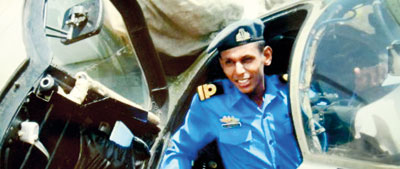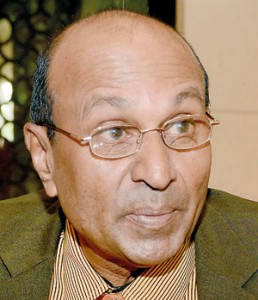News
Victims and witnesses: No protection, but persecution

Lt. Cmdr. Krishan Welagedara is another witness who lives under tremendous strain
On a humid night in February, Sudesh Nandimal left his sister’s house in Moratuwa to buy credit for his mobile phone. Four men milled about the gate. A vehicle was stopped a short distance away, its parking lights on.
They were still there when he returned and crowded around him. “You’re Nandimal, aren’t you?” one asked. He confirmed that he was. “Machang,” the man said, ominously, “don’t pull up the prison case. Let it go. If you pursue it, some of us will have to go in, you will have to go in or you will have to go six feet underground.”
Nandimal was a fan of Che Guevara, the Argentine Marxist revolutionary. He had been a union leader in the Department of Railways and an activist with the New Left Front. In 2007, he was arrested with several others under the Prevention of Terrorism Act (PTA) and flung into jail. The Government spread word that they were “Sinhala terrorists.”
Slapped with what he says was a trumped-up charge of possessing illegal weapons, Nandimal was prosecuted under the Firearms Ordinance. He spent several years in remand until a settlement with the Attorney General’s (AG) Department saw him released in 2013.
But the previous year, Nandimal had watched firsthand the horrific killings that took place within the Welikada prison after a riot broke out during a search for illicit weapons, drugs and mobile phones. Inmates were felled before his eyes allegedly by the Special Task Force and army in the presence of prison officers. Fifty-three prisoners were killed.
Once out, Nandimal spoke openly about the experience. He futilely gave evidence before committees appointed to “investigate” the hours-long riot. And he offered himself as a key witness in any legal case that might be filed.
His doggedness brought the men to his sister’s house–where Nandimal lived with his wife, 11-year-old son and 10-month-old daughter–that night. But he argued that he would not stop campaigning for voiceless inmates who died in 2012. The men turned hostile. “Fine, we will see,” they said, before striding off.
Nandimal went public again. The Moratuwa police recorded his complaint, made cursory inquiries and showed little interest in affording him protection. The Criminal Investigation Department claimed it had referred the case to the AG’s Department and heard nothing back. Today, Nandimal–a potential star witness–lives in fear.
Senior attorney-at-law K.S. Ratnavale has supported Nandimal in the past and frequently represents defendants and victims in PTA and human rights cases. A majority of them are Tamil. He is only too familiar with the dangers witnesses and victims face in the pursuit of justice. One reason is that structures such as the police Terrorist Investigation Department (TID) have not been dismantled.
“In the recent past, there have been threat and intimidation of witnesses in high profile cases and also in matters on ethnic basis, where Tamil people are involved,” Mr Ratnavale said. “When the offenders are from the armed forces or police, there are more tendencies towards intimidation and threat so witnesses come forward at very high risk. I get information every day about people being visited at home, especially in the North and East.”
The scourge of witness and victim threat, intimidation or harm is not new in Sri Lanka. It is shockingly widespread. And it happens regardless of the case or type of crime committed. For some, particularly in high profile judicial proceedings, bearing witness has become question of life-or-death. Even those appearing before commissions or committees have not been spared.
Mr. Ratnavale represented witnesses before the Udalagama Commission which was appointed in 2006 to inquire into cases of grave human rights violations including the killing of 17 workers of the French NGO Action Contre la Faim. The Commission set up a Victims and Witnesses Assistance and Protection Unit (VWAPU) headed by a senior police officer named Jayakumar Thangavelu.

When will it all end: Lt. Cmdr. Krishan's father
The Sunday Times contacted retired Deputy Inspector General (DIG) of Police Thangavelu in Canada. He said that, while the Commissioners backed and supported him, “the State, through a member of the panel of counsel from the official bar assisting the Commission, hampered and caused serious obstacles to my functions”. The situation soon became serious.
DIG Thangavelu was tipped off that, at a high-level meeting of security forces and police chaired by a top Defence Ministry official, a member of the panel of counsel from the official bar assisting the Commission had said he was holding some victims and witnesses incommunicado and coaxing them to give evidence inimical to the interest of the State.
“In response, the top official had entrusted the task of eliminating me to a unit of the security forces,” he wrote in an email to the Sunday Times. “Since this source had previously given me information of the impending assassination of a prominent political personality, I totally believed in what I was informed and subsequent events vindicated my belief”.
An outspoken police officer, DIG Thangavelu confirmed that threat and intimidation of victims and witnesses continue to be severe, crippling challenges: “…by politicians and their offspring, drug barons and the rich and mighty, especially where political interference still persists, totally undermining the rule of law”.
Lt. Cmdr. Krishan Welagedara is another witness who lives under tremendous strain. The Navy officer is a chief witness in a Habeas Corpus application filed in respect of five young Sinhala, Tamil and Muslim men who are missing since 2008. Their abductions are being investigated by the Criminal Investigation Department (CID). Preliminary findings point towards an extortion racket; huge payments had been solicited from their next of kin in exchange for their safe return. There is no trace of them yet.
In a statement provided to the CID and revealed to Court, Lt. Cmdr. Welagedara says he had seen the five men at the Trincomalee Navy Base in 2009 while he was stationed as an intelligence officer there. Among other things, he has divulged that they had been beaten up and had begged him to rescue them. He also traced their vehicles to various Navy locations.
There followed a campaign of targeted reprisal by the Navy, said Asoka Welagedara, his father. People took video footage of their home. Stories were planted in media and websites calling him a traitor.
A valued source told Lt. Cmdr. Welagedara that there could be a threat to his life. He received a telephone call from a Navy officer who warned that he would not spare him, his wife or his children. His subordinate was taken away in a white van in 2014 and brutally tortured by men who wanted Lt. Cmdr. Welagedara’s personal details.
Meanwhile, Lt. Cmdr. Welagedara’s wife, an Air Force aeronautical engineer, successfully applied for permanent residency in Australia. He was denied leave to escort his family there. In April 2016, desperate to resettle them before the deadline expired, he went without leave but telephoned his seniors with precise details of his return. He said he would surrender when he came back in 17 days.
They arrested him, put him in a cell and, after a court-martial, docked four years off his seniority. The punishment was reversed only this week after President Maithripala Sirisena intervened. In his absence, Lt. Cmdr. Welagedara’s room at the Navy headquarters in Colombo was broken into, his documents and laptop taken away. His father does not know where all this will end.
There continue to be hundreds of cases of threat and intimidation every year. In June, this year, a 14-year-old Tamil girl was raped by a bus driver. She was then beaten at the Haputale police station by a woman police constable who told her not to reveal she had been sexually assaulted by the culprit when taken before the Judicial Medical Officer. This was a clear instance of a victim being targeted.
All this goes on unnoticed and unattended to. What should be treated as an unacceptable obstruction of justice has become an everyday occurrence in Sri Lanka. There is no research into just how many cases have been compromised or are dismissed as a result of this pandemic.
| Law passed in 2015, but flaws block implementation Sri Lanka’s witness and victim protection legislation was eleven years in the making. The law, titled Assistance to and Protection of Victims of Crime and Witnesses, was finally enacted in January 2015, just two weeks after Maithripala Sirisena won the presidential election. But more than one year after it became operational, the essential structures needed to protect and assist victims and witnesses are missing. The National Authority for the Protection of Victims of Crime and Witnesses was appointed amidst much fanfare in January 2016. It was headed by retired High Court Judge Nimal Nambuwasam who, incidentally, quit his post within a short period. Then it was found that the Justice Minister Wijeyadasa Rajapakshe–who had signed the gazette providing for Parts I to IV and Part IX of the law to be brought into operation–had not actually been given the relevant subject by the President in the assignment of functions and duties. Therefore, his action had no effect in law. This oversight has now been corrected and letters have been sent to various institutions advising them to make fresh nominations to the National Authority. At the same time, however, Minister Rajapakshe formed a committee headed by Dr Laksiri Mendis, an eminent jurist, to revisit the law with a view to introducing amendments. Solicitor General Suhada Gamalath is also a member of this group and the current Chair of the National Authority. “We have to make this law more compatible with international standards and to give some serious consideration to introducing standalone provisions to deal with children, mentally affected persons and battered women as victims and witnesses,” he told the Sunday Times in an interview. The committee will start work tomorrow, he said, adding that concerns expressed by the UN High Commissioner for Human Rights in this regard will be taken on board. “We hope to have a timeline and make our recommendations as expeditiously as possible,” Mr Gamalath stressed, adding that officials will also consider protecting the whistleblower’s right to leak information. The recent Cabinet decision to amend the law to allow witnesses to testify from overseas must be studied “with utmost care”, the Solicitor General asserted. “There is all the room for their versions to be distorted, concocted or coached so it is our duty to ensure that extraneous influences won’t operate in obtaining such evidence,” he said. The National Authority has an office in Battaramulla. A senior retired Sri Lanka Administrative Serivce officer, who is also an attorney-at-law, Pushpa Wellappili, has been appointed to get the structures in place. But substantive measures such as creating safe houses and establishing the Victims of Crime and Witnesses Assistance and Protection Fund, could take time. “Once the preliminaries are done, the real working of the project will start in a year or one-and-half-years,” Mr Gamalath predicted, cautiously. Civil society groups have expressed serious concerns about the law in its current form. They particularly question the rationale of delegating the task of protecting victims to policemen who engender so much mistrust in society–and rightfully so.
|

